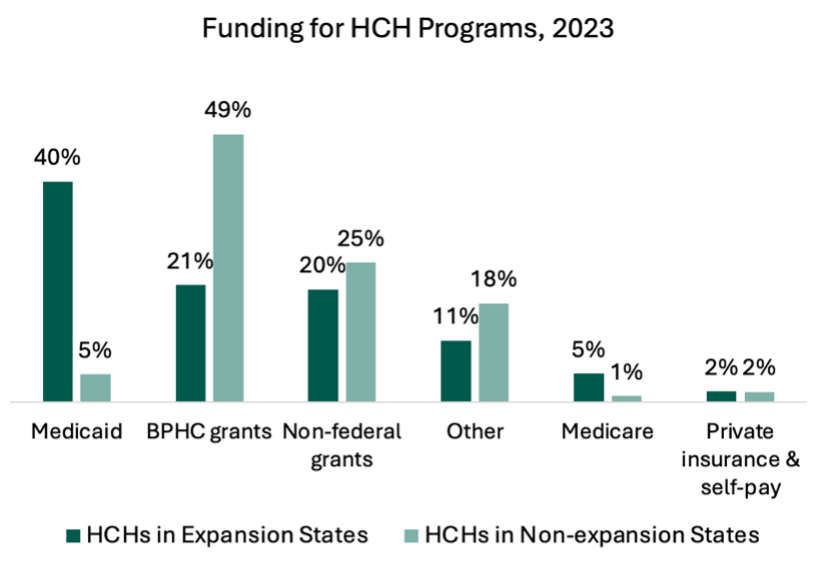The time to speak up for Medicaid is quickly running out. Lawmakers will be in their districts the week of March 17 and they need to hear that any policy changes or cuts to Medicaid to pay for tax breaks for the wealthy are unacceptable!
Last week the House passed a budget resolution that will cut $880 billion from Medicaid in order to give more tax cuts to rich folks. Policymakers are saying they will “only cut waste, fraud and abuse”—but they are coldly referring to people’s very LIVES.

Cuts to Medicaid will harm HCH patients and the providers who serve them. We must speak up. The graph below shows that 40% of HCH revenue in expansion states comes from Medicaid. For patients/clients, Medicaid pays for comprehensive care and prevents people from being uninsured. For providers, Medicaid pays for staff and clinic services. Losing Medicaid means less care, poorer health outcomes, greater uncompensated care at hospitals, and potential health care workforce layoffs.
New Resource: Impact of Medicaid Work Requirements for Unhoused People Fact Sheet
Two Actions to Take NOW
- Request an in-person site visit or meeting at your local district office during the in-district work period (March 17-23).
- Contact the closest office: Find your elected officials here and call the district office. Tell them you’re a constituent and would like to invite the Representative to isit an HCH program to understand the essential role Medicaid plays for our patients and providers.
- Provide options for the visit: Offer a few dates and times to make it easier to schedule.
- Follow up: After the call, send an email to confirm the details of your request and reiterate why you want to meet with the Representative.
- CALL 202-224-3121 and tell your lawmaker no cuts and no work requirements for Medicaid. It takes two minutes and makes a huge impact!
- Introduce yourself and the ask: My name is [NAME] and I’m calling from [city/state] to urge [Representative/Senator NAME] to protect Medicaid and reject any harmful policies that limit eligibility (such as work requirements, reductions in reimbursements, or capping the program).
- Tell your story: If you are a…
- Medicaid Recipient: Talk about how Medicaid has helped you, why a work requirement would be difficult for you (barriers to working, difficulty accessing a reporting system, struggle to document hours monthly), and what the impact would be if you lost Medicaid.
- Provider: Talk about how Medicaid helps your patients and what administrative burdens would be placed on you if they implemented work requirements.
- CEO/Administrator: Talk about how Medicaid helps your community, the importance of Medicaid funding, and what it would mean for your community to lose it.
- End with a Call for Action: Thank them for their time and say you hope they will stand with us and protect Medicaid by not adding work requirements or otherwise cutting the program.
Talking Points for Your Meeting
For ending homelessness: Medicaid reduces expensive hospital visits by paying for supportive services in housing and medical respite care in many states. When paired with rental assistance, Medicaid saves money and reduces homelessness by helping people stay healthy and stably housed.
For greater efficiency and less red tape: Policymakers say they want to increase efficiency and cut costs, yet work requirements are expensive, add a lot of administrative burden, and don’t increase employment. Find more talking points about work requirements in our factsheet.
For supporting health care: 40% of HCH revenue in expansion states comes from Medicaid. The loss of Medicaid revenue will result in health care layoffs and increase unemployment.
For recovery: Policymakers say they want people to get treatment, but Medicaid is the #1 payer of behavioral health services. Cutting Medicaid means people can’t access treatment.
Want More Policy and Advocacy News?
Subscribe to Mobilizer, our monthly policy newsletter where we dig into policy news affecting the Health Care for the Homeless community, as well as concrete advocacy actions everyone can take in their communities.

